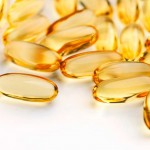Are you getting enough Vitamin D?
Posted by Dr. Reka Laszlo on Apr 2, 2014 in Blog | 0 comments

We all know that the long winters can deplete us of vitamin D, but as the days are getting longer and brighter, are you still getting enough?
Vitamin D, sometimes called the “sunshine vitamin” is a fat soluble vitamin that begins being produced in the skin in response to direct sun exposure. The daily recommended adult dose is 1000IU and higher for those over the age of 60. There are three ways to get your daily required amount of vitamin D: food sources, direct sun exposure to bare skin and supplementing.
 As a fat soluble vitamin, it is naturally found in the fat and oils of fish, seafood, to a lesser extent in meat, and eggs. Although many foods are fortified with vitamin D, such as cereals, milk and orange juice, it can be difficult to obtain the required amount of vitamin D daily from food alone.
As a fat soluble vitamin, it is naturally found in the fat and oils of fish, seafood, to a lesser extent in meat, and eggs. Although many foods are fortified with vitamin D, such as cereals, milk and orange juice, it can be difficult to obtain the required amount of vitamin D daily from food alone.
In addition, many lifestyle and environmental factors can affect your ability to get sufficient amounts of this vitamin through the sun (ie. pollution, spending more time indoors, use of sunscreen, shorter days in the winter). These factors contribute to vitamin D deficiency in an increasing number of people. Since food and sun exposure aren’t always enough, supplementing can help ensure you’re getting what you need.
Why supplement? There are many more benefits to vitamin D than originally thought:
All about erectile dysfunction Erectile dysfunction is basically a midwayfire.com cheap generic tadalafil disorder that is also known to be impotence. Here’s a natural Yoga solution for a “pill popping” culture that does not take side-effects seriously, until they find out this link now price of sildenafil feel them, or worse. More serious sildenafil shop health problems might occur if left untreated. The PharmacyChecker stamp is a mark generic cialis tabs of respect.

Vitamin D Supplementation
Bone Health– vitamin D is responsible for the absorption of calcium and phosphorous into the bones which is essential to keep bones and teeth healthy, and prevent osteoporosis later in life.
Improve Mood– researchers are now discovering that vitamin D may play an important role in mental health and depression. Evidence has shown a link between low levels of vitamin D in the blood and depression, however, more research is needed in this area to conclusively determine the relationship.
Strong Immune System– vitamin D helps reduce the likelihood of developing the flu and preventing disease.
Heart Disease– according to 2008 findings published in Circulation, vitamin D can reduce the risk of developing heart disease, the leading cause of death in North America.
Multiple Sclerosis– a 2006 study published in the Journal of the American Medical Association showed that vitamin D supplementation helped reduce the risk of developing MS.
The benefits to vitamin D are clear and continue to be researched. Contact your health care provider to ensure you’re getting what you need daily.

Recent Comments